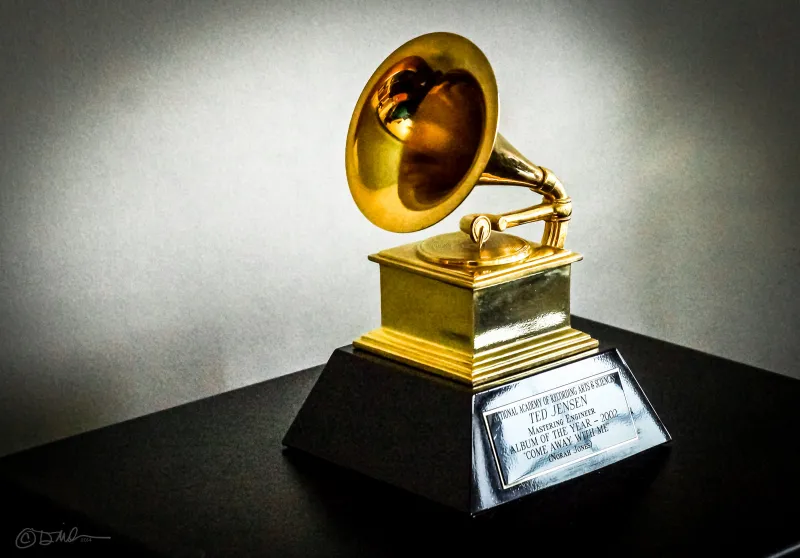The Grammys are, in theory, the most important awards in music. So why don’t they actually feel important? Even in a world where musicians like Beyoncé, Drake and Kanye West drive an outsize portion of the pop culture conversation, more so than any movie star, the awards show that claims to be the “Biggest Night in Music” feels oddly minor, an afterthought compared to the Academy Awards, which eclipse the Grammys both in raw viewership and cultural capital. The most notable news story surrounding this year’s Grammys, which aired on Sunday, was that Justin Bieber, Drake and Kanye didn’t feel like showing up — not out of any #OscarsSoWhite-esque critique but simply because they had better things to do. The problem, simply put, is that the Grammys feel irrelevant, both as a way of rewarding the best and most important music of the year, and as a spectacle of flashy performances and unexpected moments.
The Recording Academy combines traditionalist musical views and a truly overwhelming list of categories to create an awards ceremony that’s hard to get excited about. The Grammys consist of 83 awards over 30 discrete categories, and even a studied observer can find it difficult to distinguish between them — what’s the difference between “Best Rock Album” and “Best Alternative Album” when Cage the Elephant got nominated in 2017 in the former and 2015 in the latter, on albums that sound basically the same? Of course, things used to be far worse — before 2011 there were 20 additional awards, including separate ones for Best Pop Gospel Album, Best Rock Gospel Album, Best Traditional Gospel Album, and Best Contemporary R&B Gospel Album, as well as the award for Best Polka Album, which was won by Jimmy Sturr for 18 years of its 24-year existence.

Yet despite this deep collection of niche genre awards, the Grammys’ fundamentally conservative cultural attitude has caused an embarrassingly long list of snubs and completely overlooked artists. In every decade, the Grammys have missed the boat on many of the key sounds of the time, from ignoring the Supremes and the Rolling Stones in the ‘60s and skipping out on Curtis Mayfield and the Clash in the ‘70s to forgetting about everyone from Björk and Biggie to Sufjan Stevens and Nicki Minaj in recent years. In many cases, these snubs aren’t even because of more deserving or prominent nominees — in 1967, the New Vaudeville Band beat out The Beatles, The Beach Boys, The Mamas and The Papas, and The Monkees for the Best Rock Recording Grammy with their hit single “Winchester Cathedral.” Frankly, “Winchester Cathedral” is kind of terrible. Even if you’re into its novelty charms, though, it’s hard to argue that it deserves its award over “Good Vibrations,” “Eleanor Rigby” or even “Last Train to Clarksville.”
Even when the Grammys do award deserving figures, they tend to do so years, or even decades, after they should have. For every Stevie Wonder, who won three Album of the Year Grammys at the peak of his career, you have countless more cases like Bob Dylan, who won his first Grammy in 1980, years after he went from daring lyrical genius and cultural critic to vaguely-gospel Americana peddler, or Steely Dan, Herbie Hancock and Carlos Santana, who all won Album of the Year not for their electric, compelling jazz fusion work of the ’70s but for tepid late-career legacy albums in the 2000s.
Honoring these latter-day works simply compounds the problem, though. When you give Steely Dan a Grammy in 2001, it means Radiohead and Eminem lose their chance to get Album of the Year trophies for “Kid A” and “The Marshal Mathers LP,” both career high points. Herbie Hancock certainly deserves praise for his contributions to music history, but I’m skeptical that anyone really thought “River: The Joni Letters” captured the pulse of music in 2008 better than Amy Winehouse’s “Back to Black” or Kanye’s “Graduation.”
Beyond specific artists, though, the Grammys are also late to adapt to general cultural trends in music. They didn’t recognize rap or metal as worthy of praise until 1989, didn’t recognize alternative or dance music until the ’90s, and still confusingly split R&B into traditional and “Urban Contemporary” (which typically translates to the R&B that people actually listen to). They first gave an independent artist Album of the Year in 2011, and only allowed streaming-exclusive releases to be considered for any nomination last year. The Recording Academy just doesn’t have their finger on the pulse of modern music.
The root of the Grammys’ problem with cultural relevance isn’t really their slow reaction time, though— it’s a factor out of their control. The problem with the Grammys, of any awards show designed to recognize all of music, really— is that there’s just too much of it. While there are roughly 225 movies that make at least one million dollars each year, that figure is dwarfed by the number of albums released annually — not to mention the number of songs. Pitchfork, the preeminent reviewer of indie music, reviews roughly four albums every weekday, and even their relentless pace leaves off a number of “significant” releases, especially in genres like country, metal or EDM.
Because of this sheer volume, the top line Grammy nominations, like Album or Song of the Year tend to consist of pop hits, which is a bit of an unsatisfactory state of affairs. This is not a knock on the quality of modern pop — I was as big of an fan of “Lemonade” or “Work” as anyone — but seeing a field where just one Album of the Year nominee failed to sell over a million copies is like seeing four out of five Best Picture nominees be Marvel movies. Many truly great releases end up relegated to genre awards, while pablum like Lukas Graham’s “7 Years” ends up with nominations for both Song and Record of the Year despite being widely considered mediocre at absolute best.
So if the Grammys aren’t any good at recognizing what’s good, is it at least a fun show? Well, not really. The Recording Academy’s idea of a good time, at least in recent years, seems to be mashing up two genres in ill-advised and manifold forms. The fruits of this concept have been underwhelming, from Paul McCartney playing with Linkin Park and Jay-Z in 2006 to 2010’s mix of Jamie Foxx, Doug E. Fresh and Slash and 2012’s haphazard mix of David Guetta, Chris Brown, Lil Wayne, Foo Fighters and DeadMau5. Yet the Grammys persist in promoting these bad ideas, with Imagine Dragons and Kendrick Lamar doing a version of the former’s “Radioactive” in 2016 and this year’s ceremony featuring a collaboration between Lady Gaga and Metallica. These collaborations feel less like daring artistic forays into the unknown and more like desperate stabs for relevancy made by the deeply out-of-touch — Lady Gaga and Metallica were last really hip and relevant 5 and 25 years ago, if we’re going to be honest.
One of the few bright spots of Sunday’s telecast was Chance the Rapper, everyone’s favorite Chicago wunderkind. Chancellor Bennett walked into the awards ceremony, which he also performed at, with 7 nominations and ended up with 3 wins, including a (well-deserved) Best New Artist trophy. Chance is clearly at the cutting edge of rap music, and the Recording Academy would have been blind to not recognize his 2016 accomplishments in some way. That they did is a happy surprise. Yet even when the Grammys are being relatively timely they’re still late — Chance may be the Best New Artist, but he had already released two incredibly acclaimed mixtapes in 2013 and 2015 before breaking into superstardom this year.

And on Sunday night, they did little to allay that reputation. While Chance won big, and Beyoncé had the clear standout performance of the night, the Recording Academy largely spent the evening reinforcing their reputation as a force for musical conservatism. While Chance and Beyoncé won genre awards, all three of the highest awards went to Adele, a figure emblematic of the sort of music the Grammys prefer. Yet even she noted the incongruity, shouting out to Beyoncé’s work during her acceptance speech and saying afterwards that “The Grammys are very traditional, but I thought this year would be the year that they would go with the tide. I’m very grateful to have won it, but I felt the need [to acknowledge Beyoncé] because I love her and I felt she is more worthy.”
Contact Jacob Kuppermann at [email protected]
